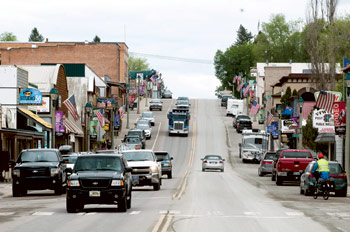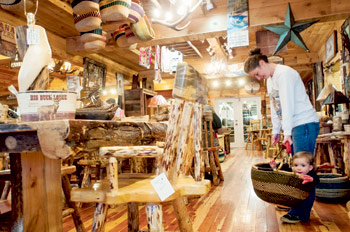EUREKA – The steady hum of Canadian traffic that passes through this remote border town sustains restaurants and filling stations, organic grocers and barbershops, hardware stores and art galleries.
They hail from Alberta and British Columbia, and travel to Montana’s northern tier to shop, work and visit Glacier National Park. Most are repeat visitors and many are second homeowners, while others hold jobs in Montana but live across the border, and vice versa.
The influx of Canadian currency is a powerful economic engine in Montana, and helped buoy Flathead and Lincoln counties through the recession. Economists predict the tourist sector will soon surpass agriculture as the state’s leading industry – largely due to the high volume of Canadian visitors – and it figures prominently into recent statewide efforts to brand Montana as a vacation destination.
But a proposal by the U.S. Department of Homeland Security (DHS) to study the feasibility of imposing a tax on travelers entering the country from Canada is giving rise to anxiety among small-business owners. And with Montana having the largest span of northern border in the country, the proposal has drawn the ire of the state’s entire congressional delegation, whose members say the measure will stanch the flow of Canadian travelers unwilling to bear the weight of an additional pecuniary millstone, particularly when the lion’s share of visitors entering the state do so to shop and spend money.
“It’s just a bad idea,” U.S. Sen. Jon Tester, who recently joined 18 other members of Congress in signing a letter asking DHS Secretary Janet Napolitano to reject the proposal, said in a telephone interview. “There is a tremendous amount of trade done across the border, not just in the Flathead Valley but all across the northern United States, and those dollars coming south were critical to keeping Montana economies afloat.”
Added U.S. Sen. Max Baucus: “I’m not convinced these new border fees pass the smell test. In fact, I’m concerned they will hurt Montana jobs and create an unnecessary barrier between Montana businesses and the customers they rely upon from Canada.”
The bipartisan group includes Rep. Steve Daines, R-Mont., who contends that the fee, which does not yet have a dollar amount attached to it, will harm border communities whose sustainability depends on cross-border travel and commerce with the country’s largest trading partner.
In Eureka, the business community says any deterrent to Canadian travelers would be devastating.
“I would say at least 70 percent of our business is Canadian,” Nikki McDougall, an employee at Heavens Peak Organics, a natural foods store in Eureka, said. “They’re like family to us. They come down here and spend a ton of money. This is a depressed economy and we wouldn’t be here without them.”
According to figures from the U.S. Department of Transportation, about 193 million people crossed U.S. land borders in 2012 – including 1.5 million across Montana’s 13 border crossings with Canada.
At the University of Montana’s Institute for Tourism and Recreation Research, Christine Oschell said surveys show that in 2012, 10 percent of all nonresident visitors to Montana arrived from either Alberta (822,182 visitors) or British Columbia (262,795 visitors).
Of the Alberta group, 77 percent were repeat visitors and 6 percent owned a second property in Montana; of the British Columbia set, 2 percent owned a second property in Montana and 67 percent were repeat visitors, according to the research.
 |
|
Traffic moves along U.S. Highway 93 through downtown Eureka. – Lido Vizzutti | Flathead Beacon |
The volume of traffic that passes through the Roosville Port of Entry a few miles north of Eureka has doubled since 2000, and last year the border crossing ushered in more than 123,000 visitors from both provinces.
“I hate to think of what a border-crossing fee might do to these communities,” Mike Cuffe, a Republican legislator who represents Eureka and the surrounding area, said. “I don’t want to think of it. I live four miles from the border and it would be devastating to these communities and economies that have been built back up because of Canadian visitors.”
Canadians have invested heavily in vacation and other properties in the Flathead Valley and elsewhere in Montana in recent years, Cuffe said, and in the summer they arrive in droves to shop and recreate.
Canadian travelers have also generated much of the traffic growth at Glacier Park International Airport in recent years, and last year accounted for one-third of the airport’s total passengers, according to Geoffrey Hale, a University of Lethbridge political scientist who studies economic, security and other cross-border issues between Canada and the United States.
“Cross-border travel, particularly for tourism and recreation, is a major engine for the economy of the Flathead Valley,” Hale said. “Canadian travelers have generated much of the traffic growth at Glacier Park and Kalispell airports in recent years.”
In border towns like Eureka, convenient cross-border travel is critical to the success of small businesses.
Colleen and Randy Richard own the Kootenai House in Eureka, and say their small business caters to Canadians in search of lodge-style furnishings, art and antiques.
“They’ll buy three bedrooms’ worth of furnishings because they can’t find log and hand-crafted western furniture in Calgary,” Colleen Richard said.
Tom Meester, the owner of Café Jax in downtown Eureka, estimated that Canadian customers amount to more than 80 percent of his business. Encouraged by the robust exchange rate, many Canadians who visit Eureka for a day of shopping stop for a burger and milkshake at Jax.
“It’s tough around here, and I attribute a lot of our success through the years to Canadians,” he said. “We’ll get vanloads of Canadians coming through on their way to Whitefish, and suddenly we’ve got 20 milkshake orders.”
The proposal is also at odds with President Barack Obama’s Executive Order on Travel and Tourism, which encourages economic growth and job creation by making the U.S. a top destination for international visitors.
“The current administration has worked so hard to decrease the barriers of travel into the U.S., and with all of the emphasis on the economic value of Canadians in Montana and nationwide [a border fee] would really surprise me,” Diane Medler, director of the Kalispell Convention and Visitors Bureau, said.
 |
|
Jessica Kelley swings her 2-year-old daughter Maya in a basket while working at the Kootenai House in Eureka. – Lido Vizzutti | Flathead Beacon |
According to DHS statistics, 350 million travelers pass through the country’s 329 ports of entry annually, providing nearly $150 billion in economic stimulus, but also taxing the border patrol stations.
“The fees that support these operations have not been adjusted in many cases for longer than a decade,” according to the DHS budget proposal. “As the complexity of our operations continues to expand, the gap between fee collections and the operations they support is growing, and the number of workforce-hours fees support decreases each year.”
The budget includes funding for 1,600 additional border patrol officers to help reduce growing wait-times at ports of entries.
In a statement from the U.S. Customs and Border Protection (CBP), the agency said the proposed fee study is intended to explore options for providing additional resources and improving services at all ports of entry.
“The study would include an analysis of the impact that collecting a fee would have on CBP operations, as well as on members of the trade and traveling public. CBP is committed to its dual mission of border security and facilitating legitimate trade and travel,” according to the statement.
The U.S. Senate Judiciary Committee has already passed an amendment to the immigration bill now before Congress to scrap the measure, which has been met with strong bipartisan opposition and seems likely to fail; nevertheless, it has raised the hackles of stakeholders on both sides of the border.
Tracy McIntyre, executive director of the Eureka Rule Development Partnership, said more and more Canadians are assimilating into Montana’s border communities as they purchase vacation homes and properties.
“They are visitors in the technical sense but they are becoming part of our community,” McIntyre said. “They volunteer at the animal shelter. Our main street businesses rely on them.”
On a recent afternoon in downtown Eureka, Elk Valley, B.C. resident Steve Patterson mounted his motorcycle at the end of a three-day stay in Eureka.
“A border fee would really kill the shopping. That’s what most of us do down here,” he said. “Gasoline costs $6.75 where I live, and it’s only $3.60 here.”
Preparing to drive off, Patterson added: “I’m going to get a haircut before I head home.”